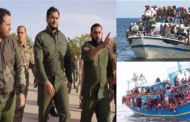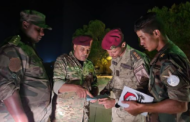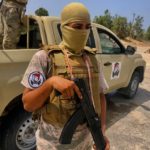Oct. 2, FM Al-Mangoush confirms some foreign fighters leaving country as interim govt seeks int’l support to withdraw remaining forces.
Oct. 1, JMC member Lt Gen Al-Tamimi announces JMC to meet soon in Geneva for talks on mercenaries’, foreign forces’ deportation.
Oct. 1, Libyan HoR, HCS start talks in Rabat on latest electoral law. UNSMIL confirms own attendance to provide counseling, support.
Several Turkish military cargo aircraft monitored as flying from Turkey to Libya during week.
NATIONAL SECURITY
- Sep. 3, the Libyan Foreign Minister, Najlaa Al-Mangoush, confirmed that some foreign fighters have left the country as the interim government seeks to mobilize international support to withdraw the remaining forces. “The reports are correct. There is a very modest start,” Najla Mangoush said at a news conference in Kuwait, according to Reuters. “We are still seeking a larger and comprehensive organisation for the exit of mercenaries,” she added;
- Oct. 1, a member of Libya’s 5+5 Joint Military Commission (JMC), Lieutenant-General Khairi Al-Tamimi announced that the committee will meet in the first week of October in Geneva. Al-Tamimi added that the JMC will discuss the exit of mercenaries and foreign forces from the country;
- Sep. 30, the United Nations High Commissioner for Refugees (UNHCR) reported that 91 —mostly Ethiopian and Eritrean— migrants were intercepted off Libya’s western coast, after spending two days at sea on a rubber boat;
- Sep. 29, the United Nations Support Mission in Libyan (UNSMIL) expressed its concern about the safety and security of kidnapped activist Emad Al-Harati, Director of Libya’s National Youth League (NYL). Al-Harati was reportedly kidnapped by unknown armed men from his office in Tripoli . This was following his call for peaceful demonstrations in support of elections on December 24. His whereabouts remain unknown;
- Sep. 27, 686 migrants disembarked on the Italian island of Lampedusa on a 15-meter fishing boat, after departing from Libya. The migrants came from Egypt, Chad, Morocco, Syria, Bangladesh, Sudan, Nigeria, Ethiopia, and Senegal. They had reportedly departed from the Libya city of Zuwara, on the western coast. The fishing boat was intercepted by patrol boats eight miles from the coast. The disembarkation operations, which include a first medical triage, ended just before one in the morning.

- Sep. 27, the ItaMilRadar website monitored two Turkish Airbus A400M cargo planes heading towards the western coast of Libya. The website confirmed that the two Airbus A400 planes took off from Turkey to the Al-Watiya airbase, and Misrata Airport. The website added that they carried out six consecutive daily flights last week, departing from Ankara. This is in conjunction with the departure of a private plane belonging to the Turkish intelligence service, from Ankara Sep. 27 morning, on an unannounced flight to Mitiga Airport in Tripoli. Turkish military aircraft keep flying between Turkey and Libya for the rest of the week.

NATIONAL POLITICS AND SOCIAL ISSUES
- Chairman of Libya’s High National Electoral Commission (HNEC) Emad Al-Din Al-Sayeh confirmed that Prime Minister Abdel-Hamid Dbaiba, and Saif Al-Islam Gaddafi, the son of Muammar Gaddafi, have the right to run in the upcoming presidential elections. Al-Sayeh noted that the law issued by the Libyan Parliament does not prevent the candidacy of either individual;
- Oct. 1, Libya’s two legislative bodies held consultations in Morocco on the latest electoral law. The first delegation represents the Libyan Parliament, and the second being the High Council of State (HCS). The electoral law raised sharp differences between the two bodies, three months before presidential and parliamentary elections are scheduled to be held. The law was opposed by the HCS, which is based in Tripoli, and the two sides are now meeting in Rabat, to avoid a new crisis;
- Sep. 27, the Undersecretary of the Ministry of Oil, Refaat Al-Abbar submitted his resignation to the Prime Minister of the Government of National Unity (GNU), Abdel-Hamid Dbaiba. Al-Abbar said in his resignation letter that this was due to personal circumstances. He thanked the PM for the confidence granted to him by assigning him as the Undersecretary of the Ministry of Oil and Gas for Production Affairs;
- On Sunday, Deputy Head of the Libyan Presidential Council, Abdullah Al-Lafi met with notorious Libyan human trafficker, Abdel-Rahman Milad (Al-Bidja), at the Naval Academy in Janzour. Al-Bidja has been on the UN Security Council’s Sanctions Committee list since June 2018, for his involvement in human trafficking and fuel smuggling. He was also subject to a special bulletin by Interpol, and an arrest warrant for his arrest was issued in April 2019, by the Tripoli Public Prosecution Office. All on similar charges of human trafficking and fuel smuggling.
- On Sunday, 46 members of the Libyan Political Dialogue Forum (LPDF) called on the United Nations Support Mission in Libya (UNSMIL) to hold an emergency session to address developments that impede the implementation of the country’s political roadmap. In a statement, the LPDF members said, “we are determined to save our country and hold the upcoming presidential and parliamentary elections as scheduled.”
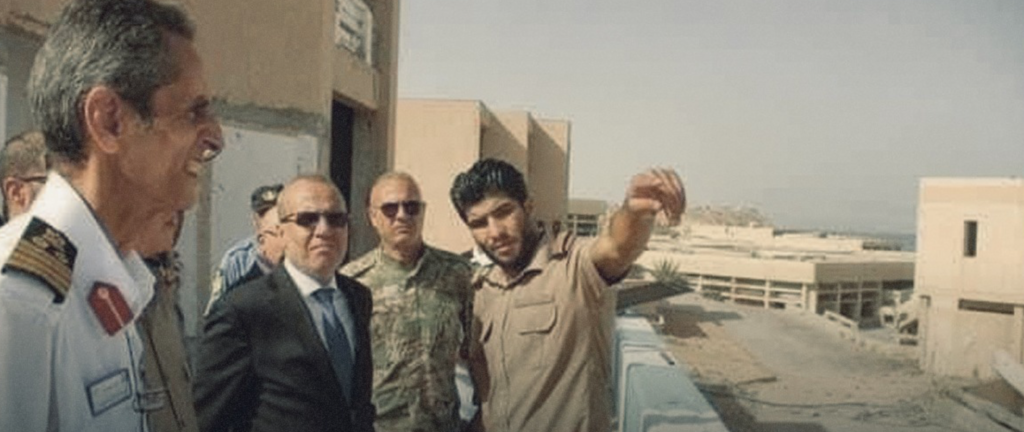
INTERNATIONAL RELATIONS
- The Peace and Security Council (PSC) of the African Union (AU) stressed the need for the immediate withdrawal of all foreign fighters and mercenaries from Libya. The PSC also underscored the need to ensure that the withdrawal is conducted in an organized, coordinated and gradual manner.
- Oct. 2, the Speaker of the Libyan House of Representatives (HoR), Ageela Saleh, received the Algerian Ambassador to Libya, Kamal Hegazy, in his office in Al Qubbah city. They discussed ways of enhancing bilateral relations between their countries. They also emphasized the need to hold the upcoming presidential and parliamentary elections on time, allowing the Libyan people freely to choose their President. The Algerian Ambassador handed Saleh a written message from the Speaker of the Algerian National People’s Assembly, Ibrahim Boughali, which aims to strengthen bilateral relations between the two countries;
- Oct. 2, Egypt Foreign Minister, Sameh Shoukry, held a meeting with the Deputy Head of the Libyan Presidential Council, Abdullah Al-Lafi, and his accompanying delegation, who are currently visiting Egypt. In a statement, the Egypt Foreign Ministry said that Shoukry reiterated Egypt’s full support for neighbouring Libya as an independent and sovereign state. He also highlighted the country’s political leadership’s directives to harness all Egyptian capabilities to help the Libyan people to overcome the current crises facing their nation;
- Oct. 1, the Head of Libya’s Presidential Council, Mohamed Al-Mnifi, held a joint press conference with the outgoing German Chancellor, Angela Merkel. Al-Mnifi said that the discussions included talks about unifying the military, and the remaining state institutions, working on national reconciliation, and expelling mercenaries from the country. In turn, Merkel confirmed that Germany will remain committed to supporting Libya, even after the government changes in Berlin. Merkel stressed the need for foreign mercenaries to withdraw from Libya as soon as possible;
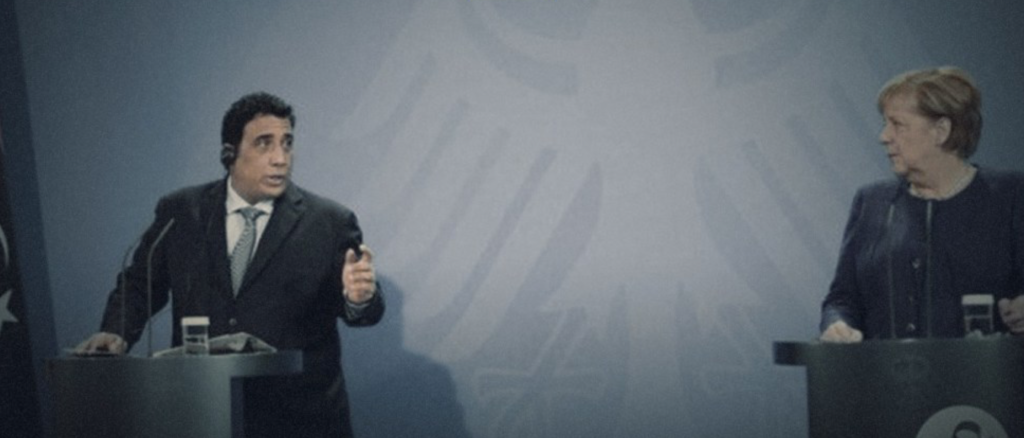
- Oct. 1, Russia Permanent Representative at the United Nations, Vassily Nebenzia stated that the Libyan elections will usher in a new page in the history of Libya. Nebenzia called for the implementation of the recommendations of the strategic review of the United Nations Support Mission in Libya (UNSMIL). Nebenzia added that UNSMIL’s restructuring will optimally take place after the end of the electoral process;
- Sep. 30, the US Senior Advisor for Special Political Affairs Ambassador Jeffrey DeLaurentis affirmed that his country will never backtrack on its strong support for the Libyan people as they move towards national elections scheduled for December 24. Speaking to the UN Security Council, the US Official reiterated his call for the withdrawal of all foreign forces and mercenaries from Libyan soil without any delay. He also regretted the Security Council’s rejection of the proposal submitted by the United Kingdom to extend the mandate of the UN Support Mission in Libya (UNSMIL) to September 2022;

- Sep. 30, France’s Ambassador to Libya, Béatrice Le Fraper du Hellen, confirmed that the French Embassy will work to facilitate the issuance of visas for Libyans. This came during a meeting with the Libyan Minister of the Interior Khaled Mazen at the Ministry’s headquarters in Tripoli. She also voiced her country’s unwavering support for maintaining stability in Libya, noting the strong and historical bilateral relations between the two countries. The ambassador also praised the ministry’s efforts to maintain security across the country;
- Sep. 30, Libyan Minister of Foreign Affairs, Najla Al-Mangoush held a meeting with her Saudi counterpart, Prince Faisal bin Farhan bin Abdullah Al-Saud in Riyadh. During the meeting, Al-Mangoush reviewed the ‘Libya Stability Initiative’, as the first purely Libyan initiative launched by the Government of National Unity (GNU). This is to achieve stability in Libya in its political, military, security, and economic aspects;
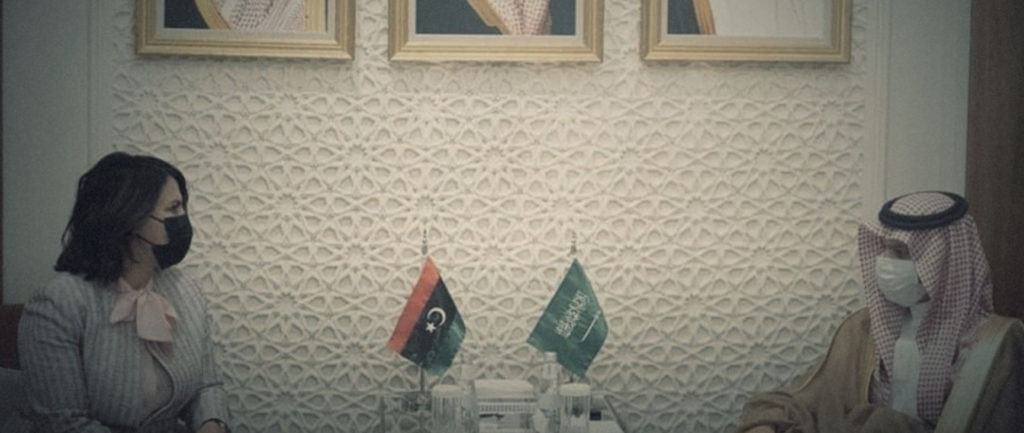
- Sep. 29, Libyan Minister of Foreign Affairs, Najla Al-Mangoush stressed the need to expedite the implementation of the Quartet Agreement on protecting and securing common borders with neighbouring countries. The agreement was signed between Libya, Chad, Niger, and Sudan in May 2018 with a view to secure the borders;
- Italy Interior Minister, Luciana Lamorgese warned of the repercussions of not holding the December elections in Libya as scheduled. “It is very important to hold the vote on 24 December,” Lamorgese said Sep. 29, during an event entitled ‘Security and Integration for a Fast-Paced Italy’. “For this reason, Europe must immediately enter into partnerships with Libya, because if the vote is not held, we risk another phase of serious instability in the North African region,” she added;
- Sep. 29, Egyptian President Abdel-Fatah El-Sisi received US National Security Advisor, Jake Sullivan in Cairo. They discussed regional issues, especially the developments in Libya, Tunisia, Syria, Yemen, and Iraq. They agreed to intensify joint coordination alongside international partners regarding the upcoming elections in Libya, as well as the withdrawal of all foreign forces;
- Sep. 28, the US Congress approved a bill that would allow the US administration to punish foreign parties that support factions and groups in Libya in the event of the collapse of the interim government and the ceasefire agreement. The bill was submitted by Democrat, Ted Deutch and Republican, Joe Wilson. 386 congressmen approved the bill, and 35 rejected it – which came under the name of the ‘Libya Stabilization Act’;
- Sep. 28, Libya’s Joint Military Commission (JMC) met with officers of the United States Africa Command (AFRICOM) in Tripoli. They discussed ways to ensure the withdrawal of mercenaries and foreign forces from Libya. Libyan Prime Minister, Abdel-Hamid Dbaiba, US Envoy to Libya Ambassador Richard Norland, and AFRICOM Commander, Stephen Townsend attended the meeting. Well informed sources told Sky News Arabia that the JMC had reached a timetable and plan for the withdrawal of all foreign forces in the country. These exceed 20,000 fighters, according to the estimates of the United Nations Support Mission in Libya (UNSMIL);
- Italian Foreign Minister, Luigi Di Maio warned against attempts to undermine holding Libya’s elections on time, according to the NOVA news agency. Di Maio stated in a television interview that the former Libyan Prime Minister, Fayez Al-Sarraj asked Rome to send forces to Tripoli. He stated that the issue of sending Italian soldiers to Libya was no longer on the table, “as Libya is now at another stage.”;
- Sep. 27, Kremlin Spokesman, Dmitry Peskov announced that Russian President Vladimir Putin, and Recep Tayyip Erdogan of Turkey would discuss a wide range of issues at their upcoming meeting Sep. 29 in Sochi. President Erdogan said earlier that he planned to discuss the Libyan and Syrian crises with President Putin in order to come to a unified solution.



